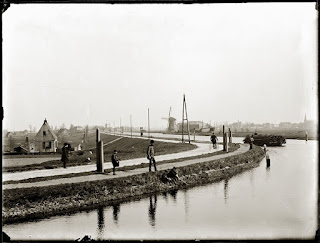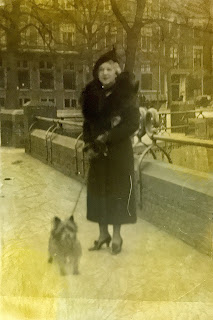School days
This post is inspired by the theme of schooldays, the post theme for week 35, 52 Ancestors Challenge. I'm reflecting on two grandparents who were school teachers. Jan Blomberg was born in Zwartsluis on 12 June1856 and his wife Johanna Cornelia Bronke was born 14 December 1851 in Zaandijk. They married on 23 May 1881 in Zaandijk. Johanna was already 30! And Jan was 25.
Jan became "Hoofd ener school" - Head or principal of a school. I haven't got any facts as to where but I assume it would be in Amsterdam. because in 1882 his eldest son was born there. These bare facts enclose so much more if you let your imagination wander.
Did Jan have a stellar career? Or was it a standard career path. How did he decide to become a teacher. He was the son of a trader and river barge captain, why didn't he follow in his fathers footsteps? Was he the smart one in the family?
His wife, Johanna was also a teacher. Did they meet at work as it were, the school both were teaching at. Maybe she was in the room next door? Did their eyes meet across a crowded classroom?
Johanna's family has German origins. Her grandfather Johann Hermann Kesseszoon Kesse was born in Menslage in 1776 but by the time he got married had moved to West Zaandam. This grandfather also changed the family name to Bronke, don't know why.
What was their daily life like? One story I remember, probably from my grandmother, is that Johanna liked to go to concerts and shows at the Concert Gebouw in Amsterdam. She would take her sons and leave a note for her husband who would have to fend for himself that evening. Perhaps this is how my grandfather came to love opera, especially Carmen was his favourite. His other favourite was Gounod's Faust.
The Time Line of Dutch History on the Rijksmuseum website gives us some idea as to what some of the prevailing issues of life at the time were. Europe was undergoing revolutionary change in the mid 19th century and the Dutch king had responded by changing the constitution so that from 1848 The Netherlands became a constitutional monarchy which limited the king's powers and ended the days of autocratic rule. From 1810 The Netherlands was a significant colonial power with colonies in Indonesia and Surinam, which lasted until 1980. The industrial revolution started in the Netherlands from the 1860's with technical and scientific innovation. Slavery was abolished overseas in 1863. The woman's suffrage movement gained momentum but Johanna would not see the granting of the vote to women in 1922 as she passed away in 1919 at the age of 68. Her husband had died the year before aged 63.
Jan became "Hoofd ener school" - Head or principal of a school. I haven't got any facts as to where but I assume it would be in Amsterdam. because in 1882 his eldest son was born there. These bare facts enclose so much more if you let your imagination wander.
Did Jan have a stellar career? Or was it a standard career path. How did he decide to become a teacher. He was the son of a trader and river barge captain, why didn't he follow in his fathers footsteps? Was he the smart one in the family?
His wife, Johanna was also a teacher. Did they meet at work as it were, the school both were teaching at. Maybe she was in the room next door? Did their eyes meet across a crowded classroom?
Johanna's family has German origins. Her grandfather Johann Hermann Kesseszoon Kesse was born in Menslage in 1776 but by the time he got married had moved to West Zaandam. This grandfather also changed the family name to Bronke, don't know why.
What was their daily life like? One story I remember, probably from my grandmother, is that Johanna liked to go to concerts and shows at the Concert Gebouw in Amsterdam. She would take her sons and leave a note for her husband who would have to fend for himself that evening. Perhaps this is how my grandfather came to love opera, especially Carmen was his favourite. His other favourite was Gounod's Faust.
The Time Line of Dutch History on the Rijksmuseum website gives us some idea as to what some of the prevailing issues of life at the time were. Europe was undergoing revolutionary change in the mid 19th century and the Dutch king had responded by changing the constitution so that from 1848 The Netherlands became a constitutional monarchy which limited the king's powers and ended the days of autocratic rule. From 1810 The Netherlands was a significant colonial power with colonies in Indonesia and Surinam, which lasted until 1980. The industrial revolution started in the Netherlands from the 1860's with technical and scientific innovation. Slavery was abolished overseas in 1863. The woman's suffrage movement gained momentum but Johanna would not see the granting of the vote to women in 1922 as she passed away in 1919 at the age of 68. Her husband had died the year before aged 63.




Comments
Post a Comment